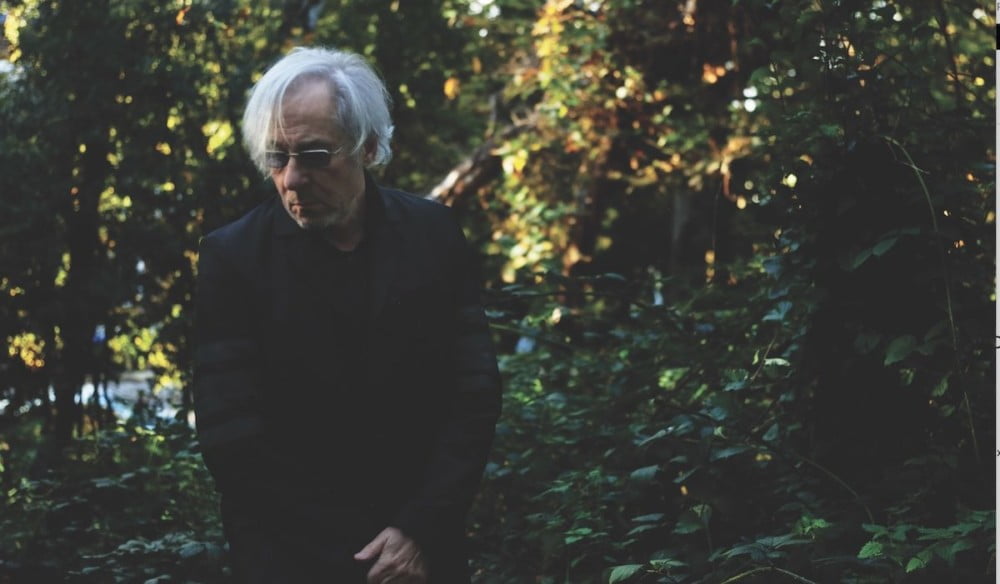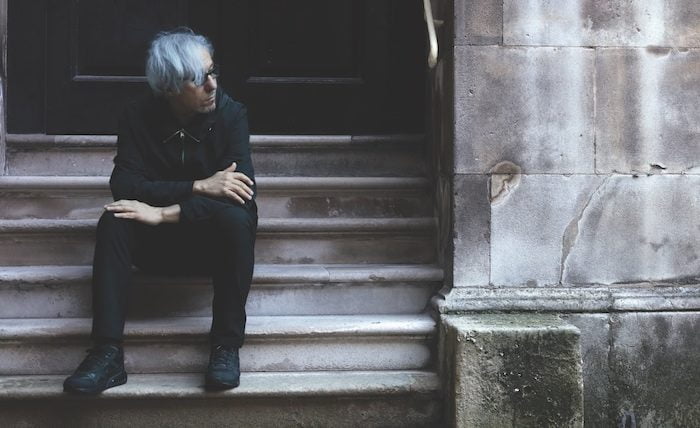
Locked down in his home studio, former Japan member Richard Barbieri’s fourth solo album wasn’t at all the record he intended to make… By Gary Tipp
Richard Barbieri has always regarded himself as a team player and it’s this selfless trait that makes him a reluctant solo artist. But when the band you’re in breaks up at the very height of its commercial success not once but twice, as happened to Barbieri with both pretty boy, new wavers Japan
in the early 80s and again with not-so-pretty, post-prog rockers Porcupine Tree several decades later, what else is a pioneering synth-wizard to do but to go it alone?
“To be honest, I’m not sure how far I want to go with solo work because personally I’ve never been all that ambitious,” recalls Barbieri matter-of-factly from the other end of a Zoom call conducted from his home in Kent. “I’ve always enjoyed success with others. I used to play a lot of team sports when I was younger and I’ve always got a lot of enjoyment winning with someone else. Much more than being on my own.”
Despite this natural diffidence to working outside of the band unit, with the release of the mesmerising Under A Spell, Barbieri is now four studio albums into a solo journey that, without the constraints of any semblance of set plan, continues to percolate nicely. With its expansive sound and elaborate arrangements, Under A Spell’s predecessor, 2017’s Planets + Persona, was widely regarded as a sonic breakthrough by the seasoned Londoner.
Come early 2020, eager to adventure deeper into his new-found sound, Barbieri was all set to make a follow-up that returned to where his previous collection of cinematic soundscapes had left off. But then the Covid-19 pandemic hit and through necessity the drawing board was promptly returned to.
Barbieri explains: “I was getting ready to jet off all around Europe and work with large ensemble groups of musicians in a number of different studios. The plan was to have a great fun time and make the recording a very social thing as well. But the experience of recording and the subsequent album turned into completely the opposite. Under A Spell certainly wasn’t the album that I intended to make.”
With over a third of the music already worked out, Barbieri was a long way through his prep for the new album but then the first UK lockdown took hold and the quiet life was to have a profound effect.
“Everything closed in and the streets were empty and quiet, deserted. My songwriting began to take on a completely different kind of vibe,” states Barbieri. “I still had material and still had ideas, so I carried on. But everything I created came under that spell, under that claustrophobic influence.”
And so Barbieri decamped to his home studio, hunkered down and got to work, that in itself was a brand new experience for him. “I moved out of London to Kent a year ago. It’s the first time that I’ve ever had a house. I’ve always lived in small flats or cramped apartments and now I have tons of space – I’ve got my own dedicated work room.”
From this work room Under A Spell was written and recorded, and it couldn’t be more of a product of its time and place. “This album feels like the darker brother to the Planets + Persona album and though I’m still not certain how I’m feeling about it, I’ve definitely captured some moods on there that I wanted to.
“To be honest, I’m yet to have the same love for it as I did for my last album but that’s entirely due to the environment it was recorded in. Two thirds of the album is quite atmospheric and dark and eerie.”
As an artist tremendously respected for his collaborative ability, did this enforced isolation mean that Under A Spell could in some way be regarded as Barbieri’s most ‘solo’ of all his solo albums? “Recording it was definitely a solitary affair. So, yes, I suppose this makes it a more personal album. It makes sense. I could only have made this album within this current climate.”
That doesn’t mean, of course, that every note you hear on the album is solely Barbieri. “I’ve still used other musicians on the album, working remotely and sending stuff in, and also I’ve reused a lot of performances from the last album, repurposing them in a different context within this music.
“So I still have those personalities of the large ensemble band that I had, but it’s different obviously than being in the same room with someone. It’s not something I’m wholly comfortable with as I much prefer more exterior involvement to create a communal feel, but, for better or worse, it exists. The only other option open to me was not to make an album. And that wasn’t an option.”
Synth survivor Richard Barbieri best describes the resultant Under A Spell as a weird, self-contained dream-state album: “During the recording I was having very odd dreams. I don’t know whether they were a result of the lockdown atmosphere outside or if they could be linked to the medications I was taking at the time. This very vivid imagery was coming to me at night, which then stuck around during the day and gradually became a crucial part of that process when I sat down to write”.
It gets a lot weirder, as Barbieri continues: “The dreams were based around a woodland pathway. This surreal, deserted, Blair Witch Project-type of environment. You’re going through these woods, heading towards this light, almost like you’re leaving life. That’s where the title Under A Spell came from, it was a feeling of not being totally in control. Almost as if your dreams are pointing you in directions that sometimes you can control and sometimes you can’t.” Whether that direction is towards or away from the light is left for you to decide.
While the album’s themes appear on the surface to be a subconscious reflection of Barbieri’s state of mind during the lockdown climate, he’s keen to add that rather than dealing simply in straight narratives his instrumental music also trades heavily in moods, feelings and a sense of place. This brings us tangentially around to, of all subjects, jazz-rock fusion. “I was thinking the other day that I used to listen to a lot of instrumental music and it didn’t have any theme or concept tagged to it. It was just musicians playing.
A genre I used to quite like listening to back in the day was jazz-rock. Jeff Beck. Chick Corea. I hate it now, but they always used to give the title of the track some ridiculous name that might be an in-joke to them but didn’t remotely relate to the music.
“I’ve got to a point where I like atmospheres, emotions and settings. For me, there’s no reason not to give some of that in the titles of the tracks, as I’ve done on Under A Spell. The listener will never get exactly the same thing that you are trying to portray but they’ll get aspects of it and their own meanings. I’m always interested in how people hear my music.”
To this end, the former Japan man opens up about the thought process behind the album’s key songs. “The title track, which is also the album opener, is the darkest of all the pieces” reveals Barbieri. “It places the listeners within this dense forest at night. You can hear vague whisperings because there’s absolutely no other outside sound. You get the sense that there must be something going on in there but you don’t get enough of a sense to realise what is.”
Just like a slab of strong mature cheddar taken just before bedtime, Barbieri’s heady cocktail of lockdown anxiety and various prescribed medications has clearly had the effect of running absolute riot with his dreams. He continues: “Another song on the album, Serpentine, is told from the perspective of a snake. Often in my dreams I’m a creature like a dog or a wolf close to the ground. But in this dream I was on the ground. I had this vivid vision that I was crawling along the ground and then going up and through branches and trees. It was weird. So I based the track’s twisted sounds and rhythms around that vibe.”
Like the vast majority of creative artists, Barbieri is always searching for new ways of working, but he admits after a near lifetime making music finding that way can be tough. “Sometimes you happen upon a short interlude and you think ‘this is something different‘ but it’s a hard thing to do. A lot of making music is relying on your experience and most of it will come from the past. It’s something you’re always striving for. Everything is derived from somewhere and I’ve really only been involved in something uniquely original once in my career.”
From the other end of the screen, Barbieri produces a copy of Japan’s peerless classic from 1981. “Tin Drum seemed to come from a universe of its own. It’s the one time with the other guys a work of art was created that wasn’t just connected to something else and existed as this completely different thing.”
But that’s not to say it won’t happen again for Barbieri. Following the release of Under A Spell, plans are already afoot to make more music with different collaborations brewing, including one with a former Japan founding father. “I’ve just begun working again for the first time in 20 years with Steve Jansen. We see each other all the time, but now we’re going to make some brand new music. We’ve just started on that.
“I’m also writing some new songs with Tim Bowness from the group No-Man. I’ve got the collaboration work going again, which is great.”
In these uncertain times there hasn’t so far been any talk of taking Under A Spell on the road. When playing live is once again an option it might be a big ask to attract even the most ardent of fans to listen to what is ostensibly his lockdown album – it could be seen to be a downer. When that suggestion is put to him, Barbieri doesn’t regard it as a problem and quickly proposes a solution. “We can always lock all the venue doors. Create a gloomy, claustrophobic atmosphere and then play for six months.”
No worries.
Classic Pop may earn commission from the links on this page, but we only feature products we think you will enjoy.



